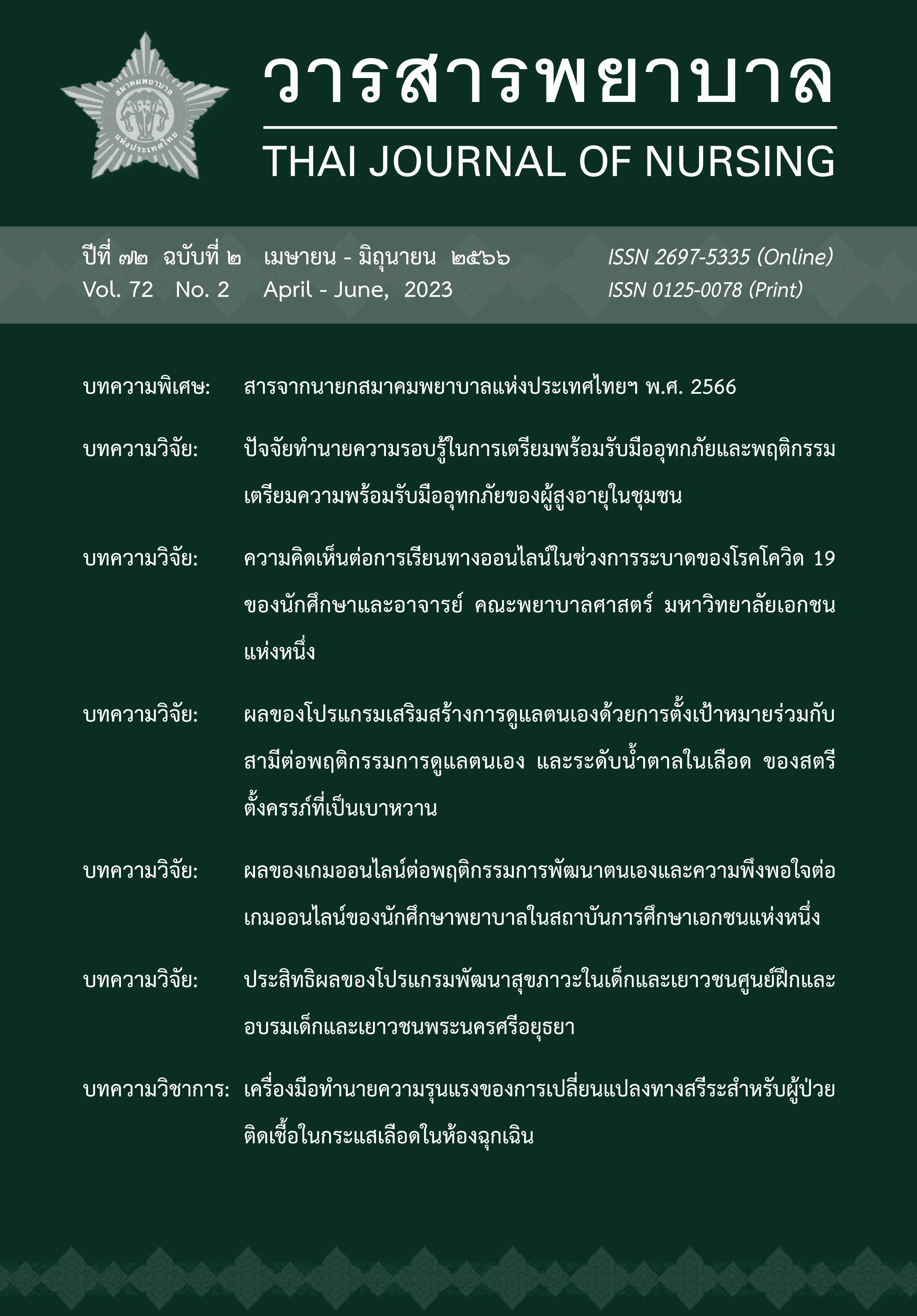Effects of the online game on self- development behavior and satisfaction among nursing students in a private university
Main Article Content
Abstract
The purpose of this quasi-experimental research was to evaluate effects of online game on self-development behavior and satisfaction among nursing students in a private university. A sample of 89 nursing students was purposively selected. The research tools were the online game, self-development behavior assessment and a questionnaire on satisfaction toward online game. The content validity of research tools were 0.85 and 0.80 -1.00 respectively. The reliability coefficients of self-development behavior assessment and a questionnaire on satisfaction toward online game, were 0.94 and 0.95 respectively. Descriptive statistics and paired t-test were used in data analysis. The results revealed that after the experiment, nursing students’ self-development behavior was higher than the pre-experiment at p < .01. Their satisfaction toward the online game were at the high level.
Article Details

This work is licensed under a Creative Commons Attribution-NonCommercial-NoDerivatives 4.0 International License.
References
กัญญาพัชญ์ จาอ้าย และ อรอนงค์ ธรรมจินดา. (2563). ผลของการใช้เกมสูติศาสตร์พาเพลินออนไลน์ต่อความรู้ และความพึงพอใจของผู้เรียน. วารสารสมาคมพยาบาลแห่งประเทศไทยฯ สาขาภาคเหนือ, 26(1), 54-65.
จิระ จิตสภา และ มุทิตา ทาคำแสน. (2564). แนวคิดการจัดการเรียนการสอนออนไลน์ด้วยเกมมิฟิเคชัน. วารสารอิเล็กทรอนิกส์การเรียนรู้ทางไกลเชิงนวัตกรรม, 11(2), 30-42.
ณัฏฐา ผิวมา. (2564). การจัดการเรียนรู้โดยใช้เกมเป็นฐานด้วยบูรณาการเทคโนโลยีเกมคอมพิวเตอร์. วารสารมนุษยศาสตร์และสังคมศาสตร์ มหาวิทยาลัยราชพฤกษ์ [ฉบับพิเศษครบรอบ 15 ปี มหาวิทยาลัยราชพฤกษ์], 1-15.
ดลฤดี ไชยศิริ. (2563). การส่งเสริมแรงจูงใจใฝ่สัมฤทธิ์ทางการเรียนโดยใช้การเรียนรู้แบบผสมผสานร่วมกับแนวคิดเกมิฟิเคชันสำหรับนักเรียนชั้นมัธยมศึกษปีที่ 4 โรงเรียนผดุงนารี [วิทยานิพนธ์ปริญญามหาบัณฑิต ไม่ได้ตีพิมพ์]. มหาวิทยาลัยราชภัฏมหาสารคาม.
ธิดารัตน์ เลิศวิทยากุล. (2560). การประเมินความก้าวหน้าการเรียนรู้โดยใช้เกมเป็นฐาน. วารสารวิทยาลัยบัณฑิตเอเชีย, 7(ฉบับพิเศษ), 104-116.
บุญชม ศรีสะอาด. (2560). การวิจัยเบื้องต้น (พิมพ์ครั้งที่ 10). สุวีริยาสาส์น.
รวีวรรณ อินจุ้ย, สรินทร เชี่ยวโสธร, อายุพร ประสิทธิเวชชากูร, และจันทนา โปรยเงิน. (2563). ผลของการจัดกิจกรรมการเรียนรู้โดยใช้เทคนิคเกมมิฟิเคชันต่อแรงจูงใจใฝ่สัมฤทธิ์และความพึงพอใจของนักเรียนพยาบาลกองทัพบก. วารสารพยาบาลทหารบก, 21(2), 377-388.
ลฎาภา ลดาชาติ. (2561). การประเมินผลระหว่างเรียน: ประตูสู่การเติบโตทางวิชาชีพครูวิทยาศาสตร์และการปฏิรูปการศึกษาวิทยาศาสตร์. วารสารหน่วยวิทยาศาสตร์เทคโนโลยี และสิ่งแวดล้อมเพื่อการเรียนรู้, 19(2), 297-323.
วิจารณ์ พาณิช. (2558). วิถีสร้างการเรียนรู้เพื่อศิษย์ในศตวรรษที่ 21. วารสารนวัตกรรมการเรียนรู้, 1(2), 4-14.
วรัตต์ อินทสระ. (2562). Game based learning - the latest trend education 2019 เปลี่ยนห้องเรียนเป็นห้องเล่น. https://wbsc.dusit.ac.th/pluginfile.php/534/mod_forum/attachment/4320/GBL%
DOC.pdf
สมาพร มณีอ่อน. (2559). การประเมินเพื่อการเรียนรู้. วารสารศึกษาศาสตร์ มหาวิทยาลัยศิลปากร, 14(1), 15-25.
สุดเฉลิม ศัสตราพฤกษ์. (2560). การจัดการเรียนการสอนในศตวรรษที่ 21 แบบห้องเรียนกลับด้านเพื่อการพัฒนาทักษะการเรียนรู้และนวัตกรรม. วารสารวิทยบริการ มหาวิทยาลัยสงขลานครินทร์, 28(1), 101-108.
อัจศรา ประเสริฐสิน. (2556). การพัฒนาตนเอง สำคัญอย่างไรในชีวิตและการทำงาน. วารสารมหาวิทยาลัยราชภัฏสกลนคร, 5(10), 73-84.
Cheong, C., Filippou, J., & Cheong, F. (2014). Towards the gamification of learning: Investigating student perceptions of game elements. Journal of Information Systems Education, 25(3), 233-244.
Fabricatore, C., & López, X. (2014). Using gameplay patterns to gamify learning experiences. In C. Busch. (Ed.). Proceedings of the 8th European conference on game based learning (pp. 110–117). Academic Conferences and Publishing International. https://www.researchgate.net/ publication/267211358. doi: 10.13140/2.1.2275.5844
Gee, J. P. (2003). What video games have to teach us about learning and literacy. Palgrave Macmillan.
Guido, M. (2016, November 3). 5 Steps to implementing game-based learning in the classroom.
Prodigy Education. https://www.prodigygame.com/main-en/blog/implementing-game-based-
learning-in-the-classroom-examples/
Magginson, D., & Pedler, M. (1992). Self-development: A facilitator's guide. McGraw-Hill.
Rivera, E. S., & Garden, C. L. P. (2021). Gamification for student engagement: A framework. Journal of Further and Higher Education, 45(7), 999-1012.


